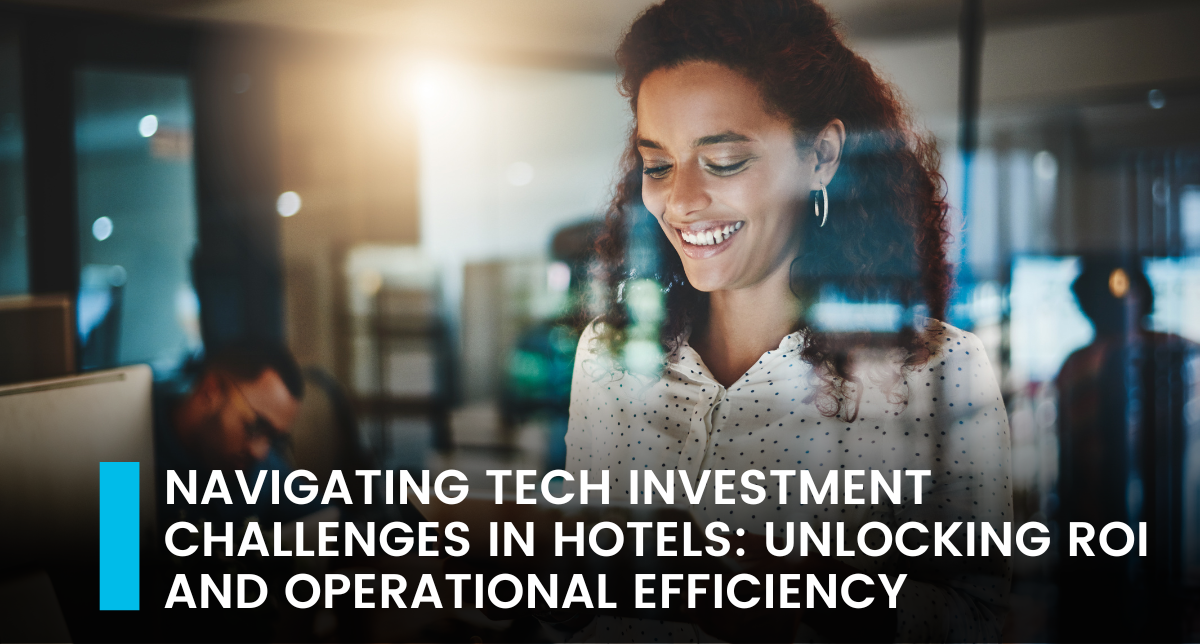Introduction
In today's fast-paced and ever-evolving hospitality industry, technology plays a crucial role in driving operational efficiency, enhancing guest experiences, and ultimately, maximizing profitability. However, hoteliers often face various challenges when it comes to making strategic tech investments. This article delves into the tech investment challenges that hotels encounter and highlights the potential return on investment (ROI) and operational benefits that can be achieved through the implementation of comprehensive technology platforms, particularly in the realm of workforce management.
- Cost-Effective Solutions: One of the primary challenges hoteliers face is finding cost-effective technology solutions that align with their budget and provide tangible ROI. Traditional legacy systems often come with hefty price tags, making it difficult for hotels, particularly smaller ones, to invest in advanced technology. However, the advent of cloud-based software as a service (SaaS) models has opened up opportunities for hotels to adopt scalable and affordable solutions that deliver significant cost savings and operational efficiencies.
- Integration and Data Flow: Hotels often operate with multiple disparate systems, such as property management systems (PMS), point of sale (POS) systems, and various operational tools. The challenge lies in integrating these systems to ensure a seamless flow of data and information. Investing in comprehensive platforms that offer integration capabilities allows for real-time data synchronization, eliminating manual data entry and reducing the risk of errors. This integration streamlines operations, enhances productivity, and provides accurate insights for better decision-making.
- Training and Employee Adoption: Introducing new technology to hotel staff requires adequate training and change management initiatives. Employees need to be empowered and educated on how to effectively use the technology to improve their workflows and enhance guest experiences. The challenge lies in ensuring widespread adoption and overcoming resistance to change. Hoteliers must invest in comprehensive training programs and ongoing support to ensure employees embrace the technology and fully leverage its capabilities.
- Customization and Flexibility: Every hotel is unique, with its own operational requirements and processes. Off-the-shelf technology solutions may not always align perfectly with the specific needs of a hotel. Customization and flexibility become critical factors in successful tech investments. Hoteliers should seek platforms that allow for customization, enabling them to tailor the technology to their specific operational workflows, reporting needs, and guest service requirements.
- Scalability and Future-Proofing: Hotels must consider scalability and future-proofing when making tech investments. As the business grows or market dynamics change, the technology should have the capability to adapt and scale accordingly. Investing in scalable platforms ensures that the technology can accommodate a growing number of properties, increased guest volumes, and evolving industry trends. Future-proofing investments minimizes the need for costly system replacements and upgrades in the long run.
- Return on Investment: The ultimate goal of any tech investment is to deliver a positive ROI. When it comes to workforce management systems, the potential for ROI is significant. By leveraging labor management modules, hotels can achieve an average 8% reduction in labor costs, leading to substantial savings. Moreover, increased staff efficiency and productivity further compound the ROI, contributing to improved profitability and asset value. Hoteliers should carefully evaluate the potential ROI and consider the long-term benefits of technology investments.
Despite the challenges, hotels cannot afford to overlook the importance of strategic tech investments. By addressing cost-effectiveness, integration, training, customization, scalability, and ROI considerations, hoteliers can navigate these challenges and unlock operational efficiencies, enhanced guest experiences, and improved profitability. Investing in comprehensive platforms that seamlessly integrate systems and provide data-driven insights empowers hotels to optimize their workforce management, streamline operations, and increase their overall competitive advantage in the dynamic hospitality landscape. Embracing technology with a clear understanding of the potential ROI can propel hotels towards sustained success and drive long-term profitability.
A workforce management system serves as low-hanging fruit when it comes to ROI in the hotel industry. By implementing a labor management module, hoteliers can witness an average 8% reduction in labor costs, resulting in substantial savings. However, the true value of technology investments lies in the compounding effects of increased staff efficiency and productivity. Seemingly small shifts in scheduling precision based on demand or optimizing task assignments can lead to significant improvements in operational efficiency and financial performance across portfolios.
To fully harness the benefits of technology investments, integration is key. Hotels should strive to integrate their various systems and invest in comprehensive platforms that facilitate seamless data flow. This not only makes life easier for managers but also provides frontline employees with simplified access to the tools they need to excel in their roles. Real-time data synchronization eliminates manual data entry, reduces errors, and enables informed decision-making. The integration of systems streamlines operations, enhances productivity, and allows for accurate insights into the performance of the hotel.
Training and employee adoption are crucial aspects of successful technology implementation. Hoteliers must invest in comprehensive training programs to empower employees and educate them on the effective use of the technology. Change management initiatives help overcome resistance to change and encourage widespread adoption. By fostering a culture of technology adoption, hotels can unlock the full potential of their investments and achieve sustained operational improvements.
Flexibility and customization are vital when selecting technology solutions. Off-the-shelf options may not align perfectly with a hotel's unique operational requirements and processes. The ability to customize the technology ensures that it fits seamlessly into existing workflows, reporting needs, and guest service requirements. Customization enables hotels to tailor the technology to their specific needs and maximize its impact on operations.
Scalability and future-proofing considerations are essential for long-term success. Hotels need to invest in technology that can adapt and scale as the business grows or market dynamics change. Scalable platforms can accommodate a growing number of properties, increased guest volumes, and evolving industry trends. Future-proofing investments minimize the need for costly system replacements and upgrades, providing a solid foundation for sustained growth and profitability.
In conclusion, the challenges associated with tech investment in hotels can be overcome by prioritizing cost-effectiveness, integration, training, customization, scalability, and ROI considerations. By embracing comprehensive platforms and workforce management systems, hoteliers can optimize their operational efficiency, enhance guest experiences, and drive long-term profitability. Investing in technology is not just a necessity in today's competitive landscape—it is an opportunity to gain a significant competitive advantage and position hotels for sustainable success in the future.






